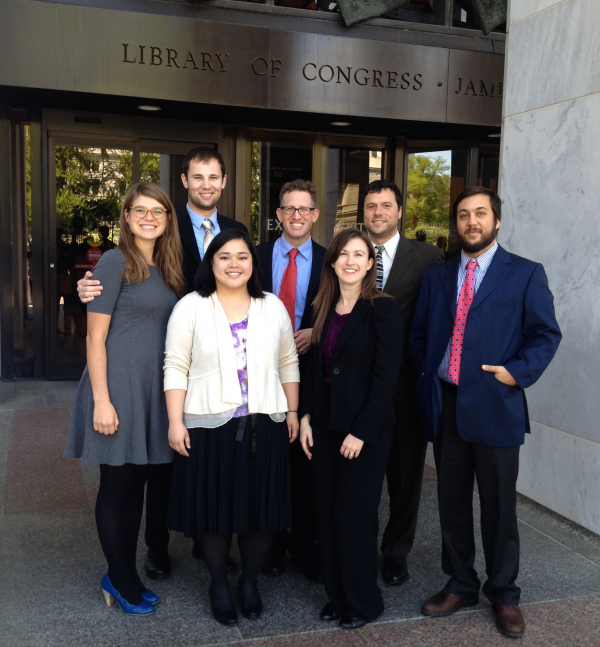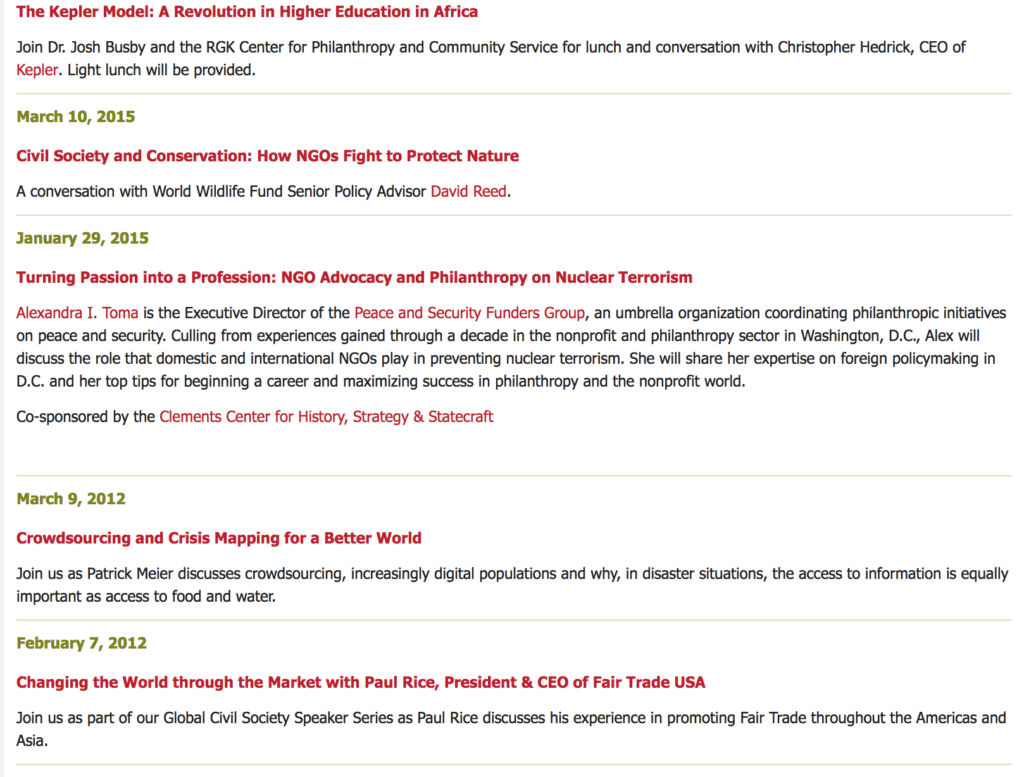This is part IV in a series on bridging the gap between policy and academia. In part I, I wrote about principles of engagement. In part II, I wrote about short-form writing and in part III long-form writing. In this post, I turn to teaching and speakers’ series.
You may also be able to organize policy-relevant courses and host outside speakers, both of which can bring you in closer contact to the policy world and give you an opportunity to develop policy-relevant work for them.
Policy-Relevant Courses
I teach at a school of public affairs. We regularly have year-long courses for MA students on a policy topic where a client provides us resources to support student travel and other costs. After tenure, I decided that I wanted to work on issues that I cared passionately about. Several years ago, I ran a year long course on climate mitigation in the major economies.
Most recently, moved by the poaching crisis facing elephants, rhinos and other species, I carried out a course on Global Wildlife Conservation for the Congressional Research Service. My students wrote six CRS style policy reports for their senior leadership. Since the student papers were proprietary to CRS, I also had them do blog posts.
During the year, we developed professional relationships with the Wildlife Conservation Society as well as the World Wildlife Fund. We capped off the course by presenting our findings to CRS senior leadership, wildlife conservation NGOs, and briefed staff and members of the Texas Congressional delegation on our work.
Out of this work, I’ve only been able to write one piece thus far, a Monkey Cage piece on demand for ivory, but we had a pretty unique opportunity to share our work directly with a variety of different policy audiences through the class.
That said, these are hard courses to run for a number of reasons.
Show Me the Money
The most daunting challenge is finding a client for whom you can do valuable, interesting work. It can also be difficult to leverage enough funds to make these courses viable.
If, for example, you have a class of 15 to 20 students, and you want to send them to do field work, it can be quite costly. Let’s assume about $1,000 per student and you are quickly in the $15,000 to $20,000 territory. More ambitious efforts to far flung places can be more expensive still, on the order of $50,000.
Without a sustained effort from a school or contacts with funders with deep pockets, it is a challenge to mobilize resources for these kinds of classes. I did two such classes in two years, and scraping and hustling for that kind of money is time-consuming and exhausting.
Matching Client Expectations and Student Capabilities
Beyond financing, another difficulty is aligning client expectations with what students can reasonably achieve. It can take considerable iterative work to fashion something that the client finds useful and students can do.
It is one thing to identify the deliverables for the client before the class has started. It is another to communicate that effectively to the students and ensure that they are on board with what you and the client have agreed to. It really helps if the client is willing to come and meet with the students face to face.
In my wildlife conservation course, the clients made the trip from DC to Austin and were very involved in getting to know the students. They also gave ample feedback on drafts of their work. Still, it was a challenge for the students to align their writing to stylistic and substantive conventions that the client wanted. The Congressional Research Service has a distinct style of writing that does not quite come naturally to many students. You may face similar problems, particularly where students are inclined to deliver over-long materials that stray from the guidelines of your clients. Line editing bad writing can suck up a lot of your time unless you demand that the students do a lot of that themselves.
Moreover, if crafting policy relevant advice is difficult even for experienced academics, the challenge is as if not more steep for students who may have less exposure to the range of relevant and viable options. They certainly have more limited exposure to particular policy programs and agencies.
Organizing the Class and Group Dynamics
One final challenge is knowing how much background you need to give the students before you provide them with time to work. Typically, these kinds of classes are divvied up into group writing assignments. Moreover, these classes tend to be lightly structured with some lectures at the beginning of the year and progressively moving towards the students working in groups on their own. Unstructured classroom time is something many of them have trouble with.
You will likely have a group of mixed capabilities and backgrounds so even if a few students know a fair amount about the topic, a number of them will need some introduction from you or other experts on the material. In my wildlife conservation class, we resolved this with a weekend background briefing with two CRS staffers and a third expert from a wildlife NGO. In my climate class, we invited outside experts in to Skype in to the class over a series of weeks. I also tried having the students take charge of presentations for different topics and background readings.
Given the mixed quality of students and their degree of interest in the course, you might find that group dynamics are fraught with some members having to carry weak or unmotivated team members. A few disruptive students with bad attitudes can make the rest of the class a little challenging so on some level, it is like the professional environment that students might face in the real world, but it doesn’t help your end product to have rancor that is difficult to manage.
Guest Speakers
 Another complementary strategy to make policy connections is through speakers’ series. I first got to know my contacts for my wildlife conservation course by bringing one of them to campus.
Another complementary strategy to make policy connections is through speakers’ series. I first got to know my contacts for my wildlife conservation course by bringing one of them to campus.
For a decade, I have brought in guest speakers from the practitioners’ world to my university as part of a global civil society speakers series.
We have brought in folks from Kiva.org, the Gates Foundation, the ONE Campaign, the World Wildlife Fund, the Fair Trade Foundation, among many others.
That has allowed me to meet a number of people whose work I greatly admired and allowed me in a number of cases to develop continued relationships with them.
At the very least, you have a chance to have your work on their radar after their visit.
Even if you lack the budget to bring out guest speakers, I have also brought in guest speakers to participate in my classes via Skype.
In many cases, policy folks are honored to come without charging an honorarium because they value academic institutions and like to meet with students. The same is true for electronic participation.
While you might not be charged with leading a series, you may have an opportunity to suggest names to senior faculty who are bringing folks out.
In my next post, I’ll talk about grants and consulting.
Joshua Busby is a Professor in the LBJ School of Public Affairs at the University of Texas-Austin. From 2021-2023, he served as a Senior Advisor for Climate at the U.S. Department of Defense. His most recent book is States and Nature: The Effects of Climate Change on Security (Cambridge, 2023). He is also the author of Moral Movements and Foreign Policy (Cambridge, 2010) and the co-author, with Ethan Kapstein, of AIDS Drugs for All: Social Movements and Market Transformations (Cambridge, 2013). His main research interests include transnational advocacy and social movements, international security and climate change, global public health and HIV/ AIDS, energy and environmental policy, and U.S. foreign policy.



0 Comments